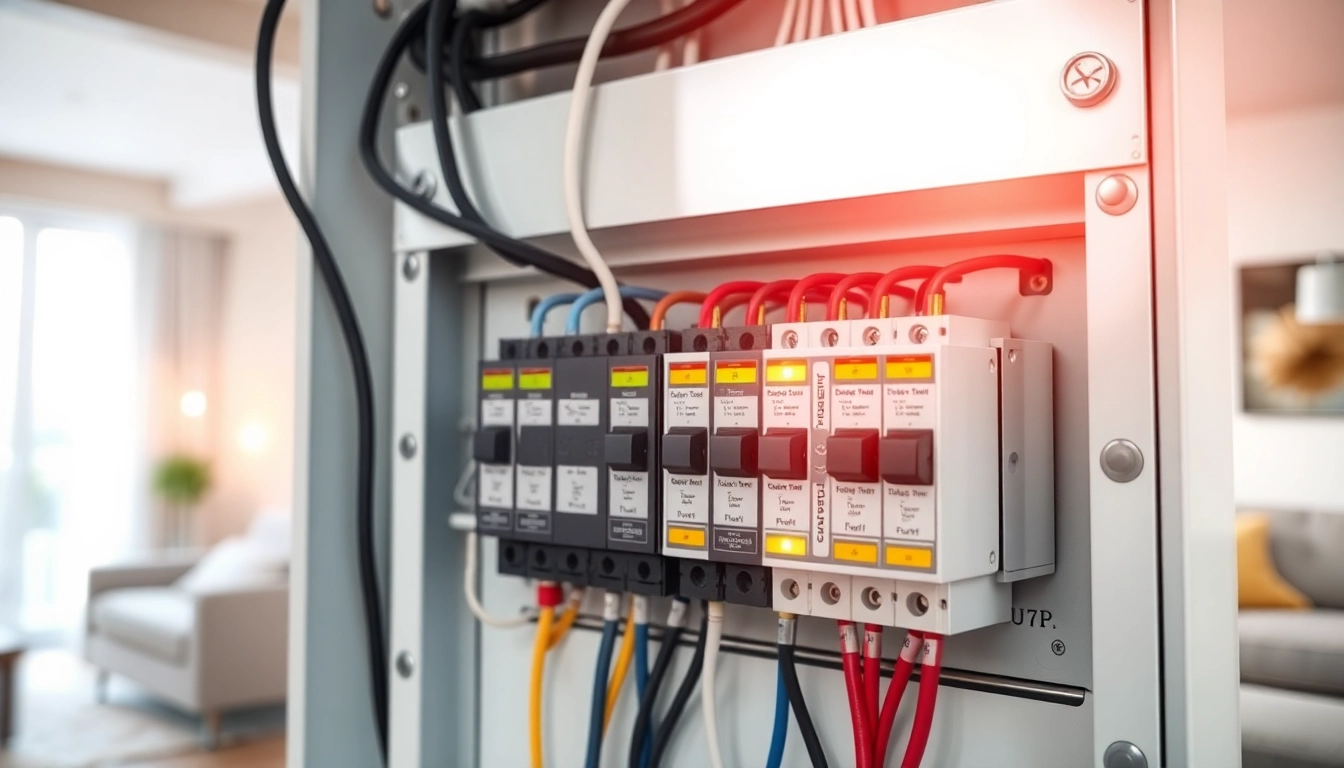Understanding the Electrical Panel
What is an Electrical Panel?
An electrical panel, also known as a service panel, is a critical component of a building’s electrical system. It acts as the main distribution point for electricity within a property, managing the flow of electricity from the utility company to your appliances and devices. Understanding what an electrical panel is and how it operates is essential for homeowners and business proprietors alike, as it directly impacts safety, efficiency, and functionality.
An electrical panel typically houses multiple circuit breakers that control different circuits throughout the building. In essence, it protects the electrical system from overloads and short circuits while facilitating the distribution of electricity to various areas. For a more detailed exploration of when to upgrade an electrical panel, consider visiting Electrical Panel informative resource.
Components of an Electrical Panel
To comprehend the full functionality of an electrical panel, it’s vital to recognize its key components. Here are the most critical elements:
- Main Breaker: This is the primary switch that controls all the power entering the panel. It can quickly disconnect power in case.
- Circuit Breakers: These switches protect individual circuits by cutting off power in the event of a fault, such as overloads or short circuits. They come in various ratings depending on the electrical load they are designed to handle.
- Bus Bars: Metal bars that conduct electricity within the panel. Each circuit breaker connects to a bus bar, helping to distribute the power efficiently.
- Grounding System: This system provides a path for electrical currents to safely discharge, reducing the risk of electrical shock.
- Neutral Bus Bar: A separate bar that handles the neutral wires carrying current back to the power source, ensuring balanced electrical flow.
How Electrical Panels Function
The electrical panel functions like a traffic control system for electricity. Electricity flows from the grid to the panel, where it is divided among various electrical circuits linked to each breaker. Each breaker corresponds to different areas and functions of the building, such as lighting and power outlets in separate rooms.
When electricity surges and approaches a circuit’s limit, the circuit breaker triggers and disconnects that circuit from the electrical flow, preventing damage to wiring and appliances. This not only includes protection against overloads but also safeguards against short circuits, which can potentially cause fires.
Signs You Need to Upgrade Your Electrical Panel
Increased Power Demands
In today’s world, households and businesses utilize a variety of electrical devices, from high-power appliances to smart home technology. If you find that your current electrical panel can’t accommodate these increased power demands, it may be time for an upgrade. Signs of increased demand include flickering lights when multiple devices are in use or needing to unplug devices to avoid overload. Many homeowners are adopting renewable energy sources, like solar panels, which can also necessitate an upgraded electrical panel to handle the increased load.
Frequent Circuit Breaker Trips
If your circuit breakers frequently trip, this is an indicator that your electrical panel may not be equipped to handle your power load. This can be particularly frustrating when it disrupts essential activities in your home or business. A single tripped breaker could signify a fault, but if multiple breakers trip regularly, this signals a larger problem. An upgrade can alleviate these nuisances, providing a more stable and secure electrical system.
Age of Your Electrical Panel
The age of your electrical panel is a significant factor in determining its efficiency and safety. Typically, electrical panels can last 25 to 40 years. If yours is approaching or surpassing this range, it’s advisable to consider an upgrade. Older panels may not comply with current electrical codes, potentially resulting in hazards. Upgrading can also ensure that you benefit from the latest advancements in technology and safety features.
Benefits of an Upgraded Electrical Panel
Improved Safety Features
One of the primary reasons to upgrade your electrical panel is enhanced safety. Newer panels often include improved safety features that reduce the risk of electrical fires and other hazards. Breakers may now include arc-fault detection devices that can spot arcing conditions, while ground-fault circuit interrupters (GFCIs) protect against shock in wet areas, such as bathrooms and kitchens. Ensuring your electrical panel meets today’s safety standards is vital to maintaining a safe living environment.
Enhanced Energy Efficiency
Upgrading to a modern electrical panel can lead to enhanced energy efficiency. Older panels may not manage electricity effectively, leading to wasted energy and higher utility bills. Newer models are designed with advanced technologies that can help control electrical flow, thus optimizing energy use and lowering your costs. By upgrading, you could also benefit from energy-efficient appliances more effectively, further decreasing energy consumption.
Increased Property Value
Improving your home’s electrical panel can significantly boost your property’s value. Prospective buyers prioritize safety and reliability when searching for homes. An upgraded electrical panel indicates that the home is well-maintained and ready to accommodate modern electrical demands. Thus, investing in an upgrade today can pay off in the future by enhancing property value and attracting buyers.
Steps to Upgrade Your Electrical Panel
Consulting a Qualified Electrician
The first step in upgrading your electrical panel is to consult with a qualified electrician. It’s crucial to work with a professional who can assess your current panel, discuss your power needs, and guide you through the selection of the right type of panel for your property. An experienced electrician will also help navigate local building codes and regulations.
Choosing the Right Electrical Panel
When selecting a new electrical panel, consider its amperage rating, which typically ranges from 100 to 400 amps. Your choice will depend on your electrical demands. A larger household with several high-energy devices may require a 200-amp panel, while smaller homes may find a 100-amp panel sufficient. Additionally, consider features like space for future expansion, modularity, and any necessary safety features like GFCI or AFCI breakers.
Implementation Process
Once you’ve chosen a suitable electrical panel, the implementation process begins. An electrician will disconnect power to your home, remove the old panel, and safely install the new one. This involves connecting the new panel to existing wiring and ensuring all connections are secure. The electrician will conduct testing and inspections to ensure everything functions properly before restoring power. It’s important to note that this process can be complex and potentially hazardous, making professional assistance essential.
Frequently Asked Questions about Electrical Panels
How Much Does It Cost to Upgrade?
The cost of upgrading an electrical panel can vary widely based on several factors, including the existing panel’s condition, your geographic location, and the specific upgrades required. On average, homeowners should expect to spend between $800 and $3,000 for the total cost, which could include materials and labor. It’s essential to obtain multiple quotes and ensure you understand the breakdown of costs before proceeding with the upgrade.
What Size Electrical Panel Do I Need?
Determining the necessary size of your electrical panel often depends on your power requirements. Households with basic electrical needs generally require a 100-amp panel, while homes with many electrical appliances, HVAC systems, or home automation systems may warrant a 200-amp or even larger panel. A qualified electrician can help calculate your load requirements to ensure the panel size is sufficient.
Can I DIY My Electrical Panel Upgrade?
Upgrading an electrical panel is a complex task that involves significant risk, including the potential for electrical fires or severe injuries. Local electrical codes often require that a licensed electrician conduct this work, making it illegal for non-professionals to attempt a DIY upgrade. Therefore, for your safety and compliance with regulations, it is strongly advised to hire a qualified professional for any electrical panel upgrades.




